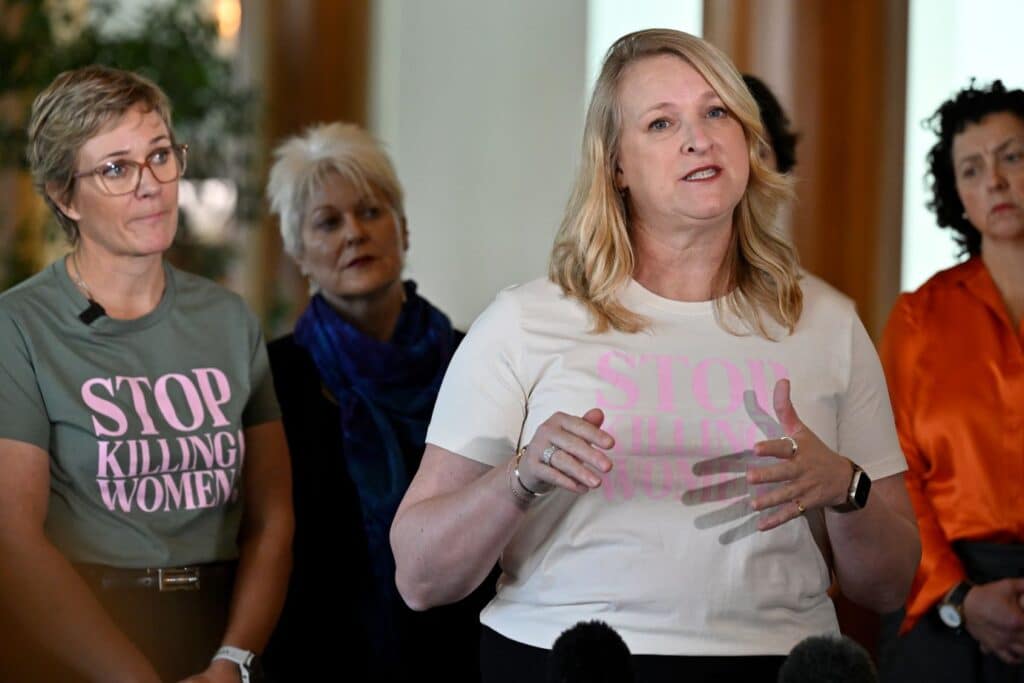New laws to limit access to technology for perpetrators alongside a national approach to tackling technology-facilitated abuse are among key suggestions put forward by independent MP, Kylea Tink.
In a report released today, Tink has outlined 12 recommendations that she will push both the Albanese government and the Coalition to agree to as part of a nationally coordinated approach to tackling the rising threat of technology-facilitated abuse.
Technology-facilitated abuse is everywhere, and it’s quickly becoming one of the most insidious forms of domestic violence. According to the e-Safety Commissioner, four in five Australian women have experienced or are experiencing some form of technology-facilitated abuse.
A recent NSW Crime Commission report found that one in four people who purchased GPS tracking devices since 2023 have a history of domestic violence.
In July, Tink held a roundtable in her electorate of North Sydney, bringing together a number of sector leaders, frontline workers, experts and advocates to hear what needs to be done to address technology-facilitated abuse. At the time, Tink told Women’s Agenda said she was concerned that the issue of technology-facilitated abuse very rarely gets raised.
Today’s report is being released to coincide with the festive season, where we know rates of family and domestic violence increase.
“The clear message I have heard from victim-survivors, service providers, researchers and first responders is that technology-facilitated abuse is widespread, rapidly growing, not well understood across the community, and overlooked by policymakers. We need to act now to stop this growing issue escalating further,” Tink says.
“Australia cannot tackle domestic and family violence if we do not tackle technology-facilitated abuse. Most people now presenting to a domestic violence service have some sort of surveillance technology attached to them. Some services say it is 100 per cent. It’s time for all levels of government around the country to come together and develop a national approach to tackling technology-facilitated abuse.”
Research by WESNET reveals that 99.3 per cent of individuals presenting to domestic violence shelters have experienced it.
Tink, who recently confirmed she would not run for another seat in the House of Representatives at the next election when the North Sydney electorate will be abolished, is using her final months as North Sydney’s MP to advocate for a national approach to the technology-facilitated abuse.
“While we won’t eliminate it overnight, a nationally coordinated, whole-of-society approach can help improve awareness and understanding, and ultimately reduce the prevalence of TFA. For example, education programs for police and the judiciary so our first responders and legal system are better equipped to identify and deal with TFA are crucial,” Tink said.
“With tracking technology now widely available – and normalised through popular social media platforms, experts are also calling for more consistent state and federal laws as well as moves to restrict perpetrators’ access to technology, rather than put the onus on victim-survivors.”
“Both Labor and the Coalition are genuine when they say want to end violence against women and girls. Ahead of the 2025 election, I call on both parties to commit to developing and implementing a national, coordinated strategy to tackling TFA in the next term of Parliament.”
See below for the 12 recommendations in Tink’s report:
1. Introduce new laws to limit access to technology for perpetrators rather than placing the onus on the victim to limit their technology use
2. Implement TFA education programs for service providers, women’s shelters, lawyers, and the judiciary
3. Design a national TFA and digital independence schools’ education program
4. Mandate TFA training courses for police and first responders
5. Develop and mandate national industry standards to govern TFA identification services
6. Legislate penalties for unethical TFA identification service providers
7. Create a federally funded Centre of Research Excellence in Family and Domestic Violence
8. Improve consistency of relevant federal and state laws
9. Develop multi-language digital literacy programs for CALD communities
10. Fund cyber safe ID technology storage options for domestic shelters
11. Partner with business to design TFA-safe technology and platforms
12. Design TFA-safe online government service platforms and products (for example Service NSW)
If you or someone you know is experiencing, or at risk of experiencing, domestic, family or sexual violence, call 1800RESPECT on 1800 737 732, text 0458 737 732 or visit 1800RESPECT.org.au for online chat and video call services.
If you are concerned about your behaviour or use of violence, you can contact the Men’s Referral Service on 1300 766 491 or visit http://www.ntv.org.au.



